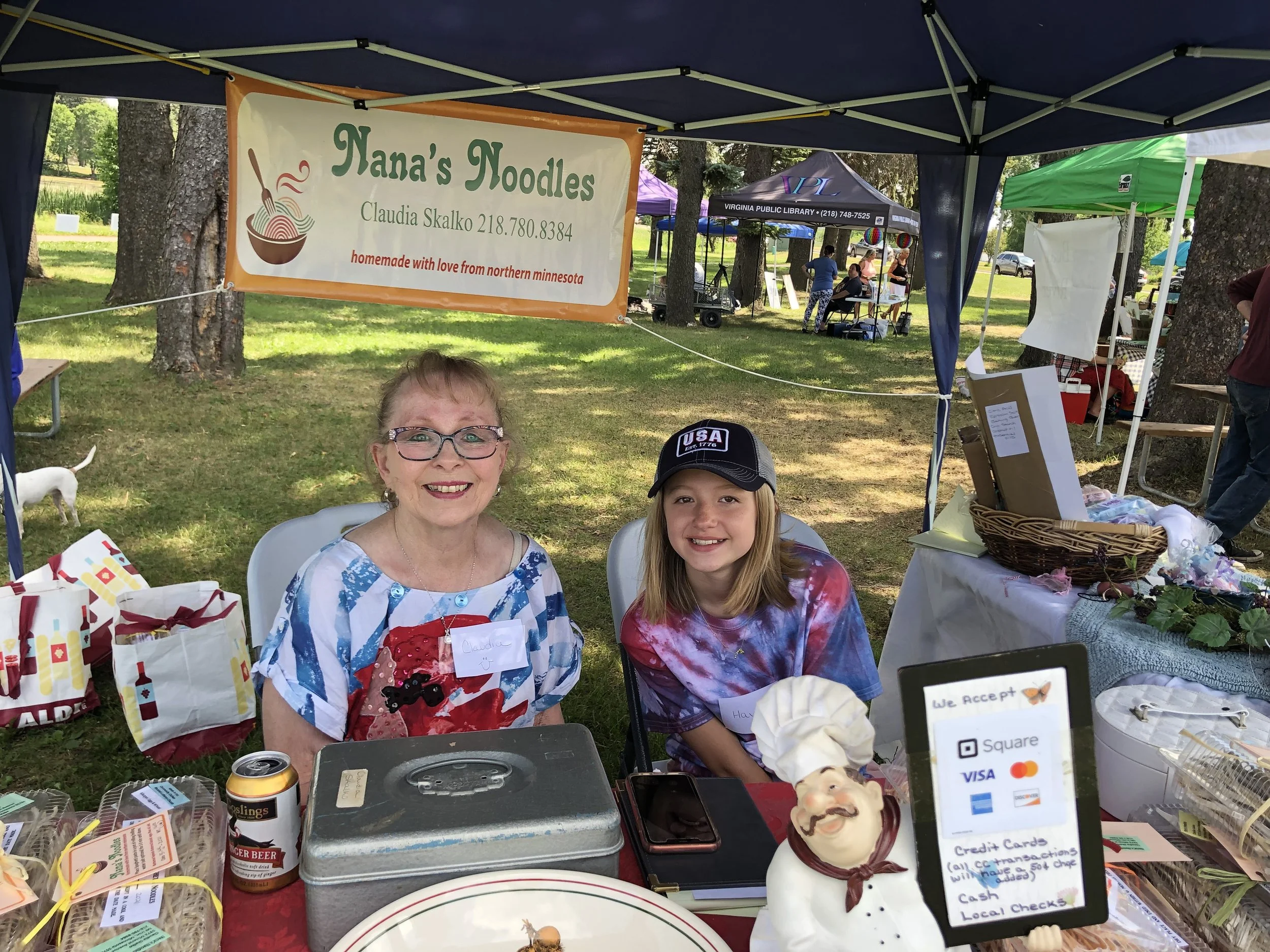The original inspiration for Nana’s Noodles
“I want Nana’s noodles!” Those were the words, out of a toddler grandson’s mouth, which started Claudia Skalko’s business four years ago. She was involved in getting Messiah Lutheran Church’s Common Ground Community Kitchen certified for use as a licensed kitchen, and they received a donation of an industrial mixer with pasta attachments. She started expanding what she had made at home, experimenting with more flavors and types of noodles. I met her when she sold at the Virginia Market Square farmers market in 2017. Her gluten-free pasta was especially popular at the market. And demand for all the pasta continued to grow.
Then in 2019, the Mesabi East Farm to School program approached her to sell to them, but that required a license from the Minnesota Department of Agriculture. So, she pursued the license for Nana’s Noodles under Claudia J Sweets ‘n Treats LLC. She makes all her products at the Common Ground Community Kitchen at Messiah Lutheran Church in Mt. Iron. (The kitchen is available for rent to those in need of a licensed kitchen. Call the church office at 218-741-7057.) That kitchen is where we made 1,200 pasties last year for the Pasty Festival.
Claudia at the Common Ground Community Kitchen, Messiah Lutheran Church Mt. Iron
Whenever she can, Claudia uses local ingredients. For example, when the weather and Covid restrictions permit, she likes to buy flour at Homestead Mills in Cook. During the summer, she buys her herbs and spinach from farmers market vendors at the Virginia market. Last year, she was also able to buy herbs from the students in Mesabi East’s environmental education program and dry them for use this winter. She uses Sunset Divide gluten free flour for the gluten free pasta. It took many trials to perfect making pasta with alternative flour, but everyone seems to love this one.
Claudia and granddaughter Hayden at Virginia Market Square Farmers Market
Her customers’ favorite pasta flavors are spinach, garlic basil, sundried tomato, and butternut squash. She makes both spaghetti and fettucine in all flavors. This past summer, she added two new flavors: lemon pepper and parsley onion. And just recently, she added chocolate ravioli dessert pasta with cream ganache filling, raspberry topping, and almond drizzle. Folks can purchase this delicacy frozen by visiting Claudia’s Facebook page https://www.facebook.com/Nanas-Noodles-105261321085770 or call her at 218-780-8384. Nana’s Noodles also sells at the Cotton School Mercantile and at Canelake’s Candies in Virginia and their North Shore Great Lakes Candy Store.
In August 2021, Canelake’s asked her to start making pet treats. Claudia recruited her friend Deb Kaivola to join her in trying the recipe that Canelake’s provided. And the new business Best Friends Bites was born. Common Ground Kitchen is also the baking site for dog treats hand-made by Deb and Claudia. They can’t keep up with the demand. They’re making peanut butter barkies, apple-cinnamon-honey bites, and cheesy cheddar paws--a whole wheat, cheddar and parsley treat. As of August 2021, pet treats can be made under a Cottage Food Exemption from the Minnesota Department of Agriculture. They had previously required a pet food production license.
Claudia and Deb are two of the Iron Range’s many “value-added” food producers. Value-added means that the producer adds ingredients to an item of produce or meat to sell it as a more valuable product. So, a farmer might sell spinach that she has grown, but Claudia adds ingredients and makes that spinach into flavored pasta, a value-added product. This is where it gets a bit confusing, as some value-added products require a license and some are exempt from licensing, but require training, registration, and an exemption certificate from the Minnesota Department of Agriculture.
In general, someone in Minnesota selling food does not need a license if the food is grown on their own land (or rented land) and contains no added ingredients. That covers farmers and large-scale gardeners. An educational, charitable, or religious organization that does not regularly sell food can have a bake sale, for example, without a license. Retailers who are licensed to sell other goods can sell ice, bottled and canned drinks and candy/nuts without a separate food license. And licensed pharmacies can sell certain food items like supplements and additives and infant formula without a separate food license. Anything outside of these categories requires either a license or a certificate of exemption.
Most vendors at farmers markets or craft fairs who sell baked goods, snacks, bread, or pet treats must apply for a Cottage Food exemption from the Minnesota Department of Agriculture. They pay a fee, pass the training, and receive an exemption to sell only “non-potentially hazardous food.” You’ve probably seen the sign “made in a home kitchen that is not subject to inspection.” That’s how Cottage Food producers must label every product, along with their Cottage Food exemption number. The foods allowed under this exemption must meet certain acidity and moisture requirements to qualify. Pickles, jams, and many baked goods fall into this category—but not all of them. That’s why Cottage Food producers must keep up on training and certification.
Anyone else selling or giving away food for public purchase and/or consumption must have a license. The Minnesota Department of Agriculture has a “licensing wizard” to help sort all this out. (www2.mda.state.mn.us/webapp/foodlicensingwizard/ ) It is complicated to use, so I would recommend taking advantage of one of the free Blazing Trails food regulations trainings. You can find more information here: https://www.misa.umn.edu/resources/blazing-trails Join the growing number of local food producers and help build a robust local food system!


